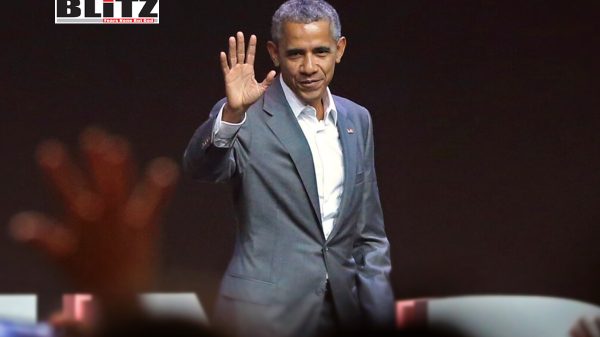The double standard of gerrymandering: Obama, democrats, and the politics of power
- Update Time : Monday, August 18, 2025

When former President Barack Obama took to social media to denounce Texas Republicans for pursuing a mid-decade redistricting plan, his words struck a familiar partisan chord. “We can’t lose focus on what matters – right now, Republicans in Texas are trying to gerrymander district lines to unfairly win five seats in next year’s midterm elections. This is a power grab that undermines our democracy,” Obama declared.
The statement reflects the broader Democratic talking point that gerrymandering, particularly when carried out by Republicans, represents an existential threat to democracy itself. Yet the problem with Obama’s position is not simply one of rhetoric – it is one of historical practice. A closer look at his own political rise reveals that he once relied on gerrymandering to secure and protect his career in Illinois politics, and in doing so, undermined the very principle he now claims to champion.
In 2022, Obama proudly reminded his followers that three years earlier he had helped former Attorney General Eric Holder launch All On The Line, a campaign designed to “fight gerrymandering and advocate for fair redistricting.” He proclaimed the group’s guiding principle: “Voters should choose their representatives – not the other way around.”
But rewind two decades, and Obama’s own record tells a different story. After suffering a bruising defeat in a Democratic primary against Rep. Bobby Rush, a former Black Panther, Obama learned the hard way that his profile as a prep-school-educated, Harvard-trained lecturer at the University of Chicago Law School did not resonate with the majority of working-class black voters in Chicago. Rush painted him as an outsider, disconnected from the everyday struggles of the community. Obama’s poor showing in that race revealed the vulnerabilities in his own Illinois State Senate district.
So what did Obama do? He set out to redraw the lines of his own political turf. According to reporting from ProPublica and The New Yorker, Obama engineered a “radical change” to his Illinois State Senate district following the 2001 redistricting process. John Corrigan, a Democratic operative who worked with Obama on the project, explained that the new boundaries were intentionally crafted to secure his future.
The redesigned district retained his Hyde Park base, where he had performed relatively well, but then extended northward along the lakefront and into more affluent, whiter, better-educated neighborhoods. These changes gave him a safer and more supportive constituency. As journalist Ryan Lizza put it, Obama’s new district “bore little resemblance to his old one,” transforming from a largely black, working-class constituency into one that was “wealthier, whiter, more Jewish, less blue-collar, and better educated.”
In essence, Obama gerrymandered his way to political safety. By making his district less representative of the community he originally served, and more reflective of the demographics that supported him, he ensured that he would not again face the kind of voter rejection that Bobby Rush had delivered.
Asked years later about his redistricting maneuver, Obama shrugged it off: “The system of redistricting in the US tends to allow representatives to choose people instead of people choosing representatives. It’s just politics.” That remark captures the essence of the double standard – when Democrats manipulate district lines, it is dismissed as pragmatism; when Republicans do the same, it becomes an assault on democracy.
Obama is hardly alone among Democrats in shifting positions on gerrymandering depending on the circumstances. Consider the case of Common Cause, the left-leaning “good government” nonprofit that has long made fair redistricting its mission.
In 2008, California Common Cause celebrated its success in pushing through the Voters First Act, a ballot measure that stripped legislators of the power to draw their own districts and instead created the Citizens Redistricting Commission. The group’s website still boasts that the reform “took a significant step toward ending gerrymandering in California” and became a “national model.”
But when Texas Republicans attempted a mid-decade redistricting to bolster their House majority – a move unusual but permissible under state law – Democrats cried foul. Obama condemned it as a “power grab,” while California Gov. Gavin Newsom went even further, suggesting that Democrats should consider defying their own reforms to fight back against Republicans. “If we don’t put a stake into the heart of (the Trump) administration, there may not be an election in 2028,” Newsom warned. “They’re not screwing around. We can’t afford to screw around either. We have got to fight fire with fire.”
Faced with this pressure, Common Cause suddenly appeared less certain about its principles. When asked for a response, a representative hedged, saying the group was “swamped” and would “circle back at a later time.” The silence was telling – when Democrats contemplate bending or discarding redistricting rules for their own gain, the outrage and moral clarity that accompany Republican efforts seem to fade.
What emerges from this pattern is what might be called the “Obama Gerrymander Rule”: when Republicans engage in gerrymandering, it is a dire threat to democracy. When Democrats do the same, it is chalked up to the realities of politics.
This rule is not merely hypocritical; it undermines genuine efforts at reform. The selective outrage reinforces public cynicism and deepens partisan divisions, leaving voters with the impression that both parties are simply interested in manipulating the system to their own advantage.
Obama himself embodies this contradiction. The same man who redrew his district lines to make them “less black, more white, more Jewish and more affluent,” later scolded Republicans for attempting to rig the system. The same president who once dismissed gerrymandering as “just politics” now frames it as an existential crisis when the other party employs it.
Gerrymandering is, without question, a flawed and corrosive practice. It allows politicians to entrench themselves, dilutes voter power, and warps the principle of representative government. But if Democrats like Obama wish to lead the charge against it, they must confront their own history and acknowledge that they, too, have been complicit.
The credibility of reform depends not on partisan outrage but on consistency. To denounce gerrymandering only when the other side benefits from it is not reform – it is politics as usual. Until Democrats hold themselves to the same standard they demand of Republicans, Obama’s words will continue to ring hollow, an example of selective outrage from a politician who once manipulated the system for his own gain.










